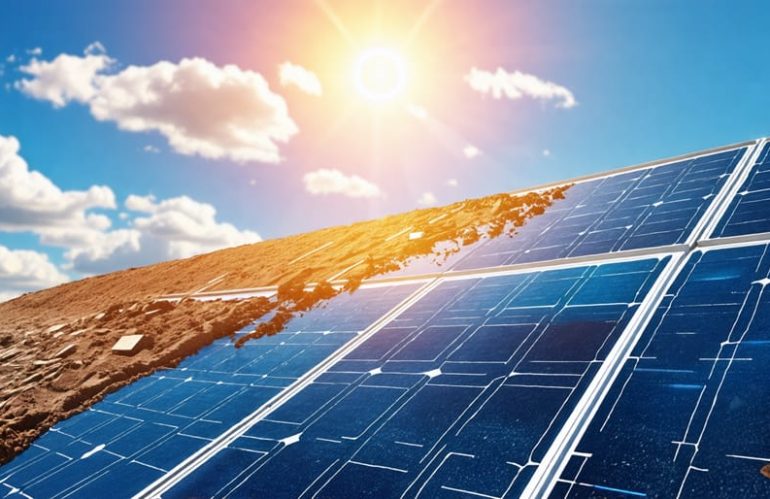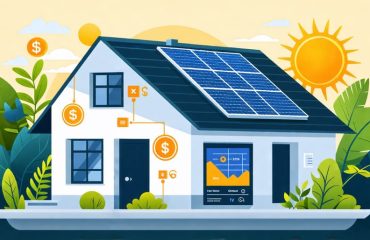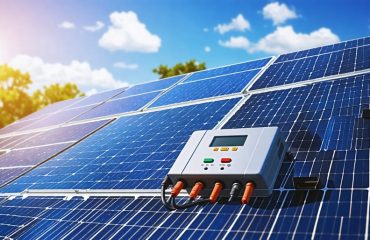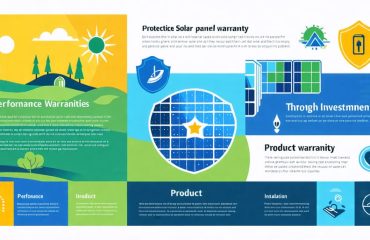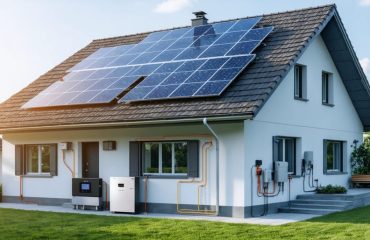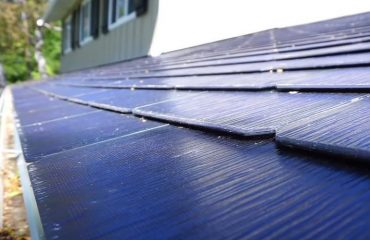Inspect solar panels regularly to identify dust, bird droppings, or debris that might hinder performance. Use soft sponges or microfiber cloths to gently wipe the panel surface, avoiding abrasive materials that could scratch the glass. Schedule cleanings quarterly, especially after seasonal changes or inclement weather, to maintain optimal efficiency. Consider hiring professional cleaning services for hard-to-reach panels, ensuring thorough and safe maintenance.
The Basics of Solar Panel Efficiency
Solar panels work by capturing sunlight and converting it into electricity. This transformation begins with photovoltaic cells, which are the main components of solar panels. When sunlight hits these cells, it shakes loose electrons from atoms, creating an electric flow. It’s a neat process, but the efficiency of solar panels—how well they convert sunlight into usable electricity—can vary based on several factors.
One key factor influencing efficiency is the amount and angle of sunlight the panels receive. Installing panels at the optimal angle and avoiding shaded areas can make a big difference. Cleanliness is also vital; dirt, dust, or snow covering the panels can block sunlight and reduce energy output. Regular cleaning ensures they operate at peak efficiency.
Temperature plays a role, too. Interestingly, panels can become less efficient as they get hotter, so ensuring good airflow around them can help keep temperatures in check. Additionally, the quality and age of the panels matter—newer models are generally more efficient, and wear over time can lead to a small decrease in performance.
Understanding these basics can help homeowners maximize their solar investment, making it a win for your wallet and the planet!
How Dirt and Debris Affect Solar Panels
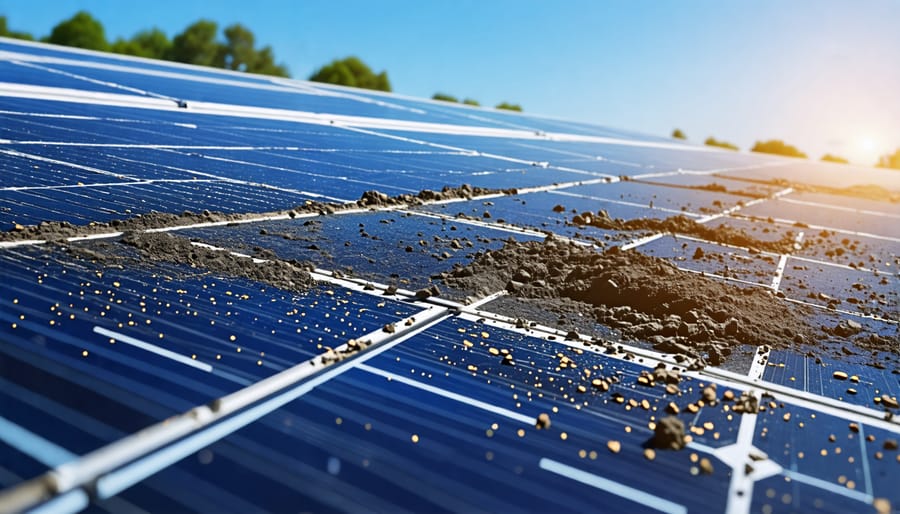
Common Contaminants
Solar panels are often exposed to a variety of contaminants that can affect their efficiency. Among the most common pollutants are dust and dirt, which can accumulate over time, particularly if the panels are situated in a windy or dry area. This layer of grime can effectively block sunlight from reaching the solar cells. Bird droppings are another frequent issue, as they are more stubborn than dust and can cause significant shading on the panels. In areas with heavy pollen, the yellow film can stick to the panel surfaces, particularly in spring, further hindering performance. Leaves, especially during autumn, can also cover panels if they are left unattended. Finally, urban smog and pollution settle on panels as a thin layer of film, reducing solar absorption. Regular cleaning of these contaminants not only boosts your panels’ efficiency but also prolongs their lifespan, offering both environmental benefits and savings on energy bills over time.
Impact on Performance
Many homeowners wonder if cleaning their solar panels is necessary, and the answer is a resounding yes. Studies have shown that dirt, dust, and other debris can significantly impact the performance of solar panels, causing energy output to drop by as much as 20% in some cases. This decrease is more pronounced in areas with high pollution, dust levels, or seasonal pollen. By keeping solar panels clean, homeowners can ensure they are operating at peak efficiency, maximizing the amount of energy harvested from the sun. This not only boosts green energy production but also translates to substantial savings on electricity bills over time. Regular cleaning ensures a quick return on investment for those looking to reduce their carbon footprint and energy expenses. Emphasizing the personal financial benefits makes maintaining clean panels even more appealing for eco-conscious individuals dedicated to sustainable living. Regular panel maintenance is a simple yet effective way to keep energy savings high and environmental impact low.
To Clean or Not to Clean?
Expert Opinions
Industry experts emphasize that regular cleaning of solar panels is essential to maintain optimal efficiency. Dust, bird droppings, and debris can accumulate over time, reducing the panels’ ability to absorb sunlight. Clean panels can generate up to 20% more electricity, translating into significant savings on energy bills. However, experts also suggest that the frequency of cleaning depends on your location and environmental factors. For instance, areas that experience frequent dust, pollen, or bird activity may require more regular maintenance. Simple practices like bird-proofing solar panels can minimize the need for frequent cleanings. Generally, bi-annual cleaning is sufficient for most residential setups, but monitoring performance is key to determining when maintenance is necessary. This proactive approach not only enhances efficiency but also extends the lifespan of your solar investment.
Case Studies and Real-World Examples
In sunny regions like Arizona, case studies have shown that cleaning solar panels can boost efficiency by up to 20%, particularly in areas prone to dust storms or pollen buildup. For instance, a homeowner noticed a significant increase in energy production after a routine wash, resulting in a notable drop in their monthly electricity bills. Similarly, businesses in urban environments reported enhanced performance following regular cleanings.
On the other hand, people living in consistently rainy climates, such as Seattle, often find that natural rainfall sufficiently cleans their panels, resulting in minimal impact from additional cleaning efforts. One Seattle homeowner performed a before-and-after comparison, seeing less than a 5% efficiency gain, thereby deeming the cost of professional cleaning unnecessary. These examples highlight the importance of considering local environmental factors when deciding on solar panel maintenance.
Financial and Environmental Benefits of Clean Panels
Maintaining clean solar panels plays a crucial role in maximizing their efficiency, leading to significant financial and environmental gains for homeowners. Dust, grime, and other debris can accumulate on solar panels over time, potentially reducing their energy production by as much as 20%. By keeping panels clean, homeowners can ensure that their solar systems operate at optimal capacity, harnessing the maximum amount of sunlight and translating it into electricity. This efficiency boost not only helps reduce energy bills but also lessens reliance on traditional energy sources, further decreasing one’s carbon footprint.
Financially, clean panels offer a tangible advantage. As solar panels generate more electricity when they’re clean, homeowners can rely less on purchasing additional energy from the grid. This means lower monthly bills and, eventually, a quicker return on investment. For those participating in net metering programs, clean panels can produce surplus energy that can be sold back to the grid, providing additional financial benefits.
Environmentally, maintaining clean panels supports sustainable energy efforts by ensuring that solar energy systems operate as intended. Improved efficiency means more clean energy production and reduced greenhouse gas emissions, contributing positively to the fight against climate change. By taking simple steps to keep panels clean, homeowners make a meaningful impact both financially and ecologically.
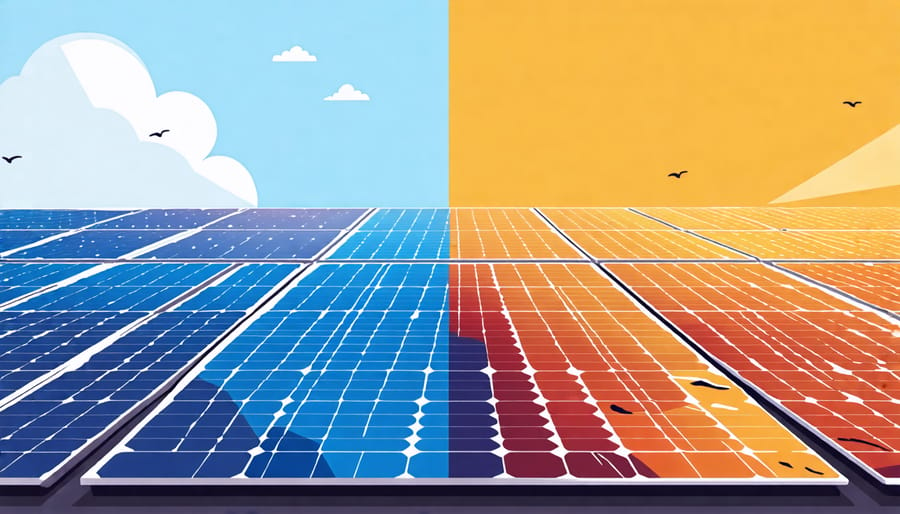
How to Clean Solar Panels Safely
DIY Cleaning Tips
To maintain spotless solar panels, safely follow these DIY steps. First, ensure your panels are powered down to avoid electrical hazards. Use a soft brush or squeegee paired with a gentle soap-water mix to remove dirt. Avoid harsh chemicals or abrasive tools, as they can damage the surface. Rinse with clean water to prevent residue build-up. Early morning or late afternoon cleaning minimizes rapid evaporation, enhancing your efficiency gains. For additional detailed guidance, explore how to clean your solar panels safely and effectively.
When to Hire Professionals
For optimal solar panel performance, hiring professionals is recommended when your panels are challenging to access or when dirt buildup is significant. Professionals not only possess specialized tools and expertise to safely clean without damaging your system, but they also ensure thoroughness that DIY methods might lack. When choosing a service, consider companies with good reviews and proper insurance, as this safeguards your investment. Cleaning services can enhance your panels’ energy efficiency, translating to lower energy bills and increased savings. This approach is especially beneficial during seasons with low rainfall that can cause stubborn grime accumulation.
Conclusion
In conclusion, maintaining the cleanliness of your solar panels can lead to significant benefits, enhancing their efficiency and maximizing energy savings. By integrating solar panel cleaning into your routine maintenance, you’re not only contributing to a sustainable future by optimizing your energy usage, but you’re also taking active steps towards reducing your energy bills. Clean solar panels absorb more sunlight, which translates to more clean energy for your home. Dispelling the myth that solar panels don’t require cleaning can empower homeowners to prioritize this simple, yet impactful task, ensuring that your investment in renewable energy pays off in both environmental and personal financial gains.

